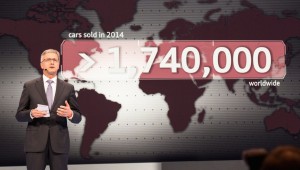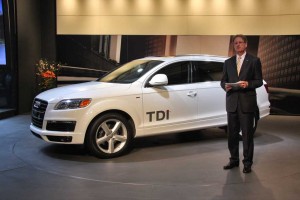
Audi's Chairman Rupert Stadler survived the reshuffling of senior executives at Audi stemming from dieselgate.
Volkswagen isn’t alone in being impacted by “dieselgate,” the fallout extended to Audi with the brand replacing four of its top executives. Audi’s Chief Executive Rupert Stadler retained his position in the shake up.
Audi’s finance chief Axel Strotbek, production chief Hubert Waltl, human resources head Thomas Sigi and sales chief Dietmar Voggenreiter are out effective Sept. 1, according to the automaker. No reason given for the changes.
VW manager Wendelin Goebel will replace Sigi as personnel chief. Peter Koessler, who heads Audi’s plant in Hungary, takes over as head of production.
Bram Schot, head of VW commercial vehicles sales, will take Voggenreiter’s post, and CFO Strotbek will be succeeded by Alexander Seitz, who has held positions in Latin America and at Chinese joint venture SAIC Volkswagen, according to Audi.
(Audi cutting $12B from budget to accelerate electrification plans. Click Here for the story.)
Stadler, who has been criticized by the German unions for his handling of the scandal, was given a five-year extension in May, which partially explains his retention. According to Reuters, Stadler had the backing of the Porsche and Piech families that control Volkswagen.
Much like VW, Audi has had to deal with large recalls and investigations since the presence of the cheat device the engines was reveal. The automaker admitted in November 2015 that its 3.0-liter V6 diesels had the device.
Volkswagen will spend as much as $25 billion in the United States to tackle claims from owners as well as dealing with fines and penalties from environmental regulators, states and dealers. The automaker offered to buy back about 500,000 vehicles in U.S.
(Click Here for more about Daimler’s recall of 3M diesels in Europe.)
Audi’s followed VW’s lead in moving away from diesels and aggressively toward electrification. The luxury brand intends to cut costs by 10 billion euros, or $12 billion, by 2022 to support its aggressive shift to electrification, according to a report by Germany’s Handelsblatt business publication.
That money will help it bring to market five all-new battery-electric vehicles, or BEVs, as well as a range of plug-in hybrids and conventional hybrids, according to the report.
The bulk of the savings would come from current research and development costs, though Audi is expected to ramp up R&D efforts for its electrification program. And it will be able to share some of those costs with VW and other sibling brands, including upscale marques like Bentley, Lamborghini and Porsche, which also are pushing into electric propulsion.
(For more on Audi’s recall of 850,000 diesels, Click Here.)
Audi’s decision to trim back other R&D programs reflects the costly hit the maker has taken as the result of its diesel emissions scandal. While the VW brand was hardest hit among the Group’s marques, Audi has of late come under the spotlight. It announced the recall of 850,000 diesel vehicles earlier this month to fix their emissions systems.

